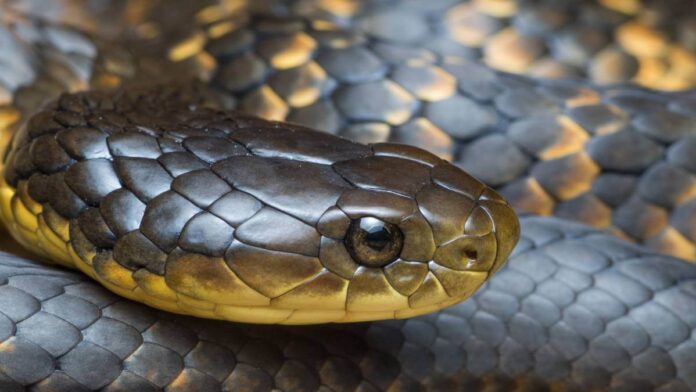Snake bite victims are endangering medical staff by bringing the reptiles with them to hospital, doctors say.
In Queensland’s Wide Bay region, doctors have come face to face with some of the world’s most venomous snakes captured by patients believing it’ll help with identification and treatment.
In one case earlier this month, emergency staff at Bundaberg Hospital, four hours north of Brisbane, were handed a plastic food container with a small eastern brown snake inside peering back at them.
The incident has prompted the hospital’s director of emergency medicine, Adam Michael, to warn patients to leave snakes alone.
“We honestly don’t want people interacting with snakes any more than they already have,” Dr Michael said.
“Any attempts to either get close to a snake to catch or to kill, or to photograph the snake, just puts people at risk.”
Dr Michael said the eastern brown brought in earlier this month was “not very well secured” and was wriggling around trying to get out.
“The staff got a fright and the serious consequence of that is it delays people’s time to treatment,” he said.
“We want people to be able to get seen and assessed quickly, and having a live snake in the department slows up that process.”
Snake ‘identity’ not needed for treatment
Snake bites in Australia are considered rare, but in March 47-year-old Jerromy Brookes died after being bitten multiple times by a suspected eastern brown snake in Townsville.
There are about 3000 suspected snake bites across Australia each year, but only 100 to 200 cases require anti-venom, according to clinical toxicology researcher at the University of Newcastle Geoff Isbister.
In the Wide Bay region alone this year, almost 100 people aged as young as one have been treated for snake bites.
“A lot of bites occur because people interfere with snakes, so they either try and pick them up or move them or do silly things with them, and that’s when you’ll get bitten, so you shouldn’t go near a snake at all,” Dr Isbister said.
He said it wasn’t the first time he’d heard of patients bringing snakes into hospital.
“It’s pretty dangerous because no one in the hospital will be able to identify it,” he said.
“If that snake gets out in an emergency department, that becomes a huge disaster.”
Dr Michael said medical staff did not need to see a snake to know how to treat patients.
“We can determine if you need anti-venom and if so, what anti-venom you need based on clinical signs, blood tests and also the snake-venom-detection kits that we keep here at the hospital,” he said.
“We’re actually not trained to identify snakes, and so it’s not helpful. It just puts the staff at risk as well as yourself.”
Snake catcher Jonas Murphy has relocated several snakes brought into the Bundaberg Hospital.
Mr Murphy said the snakes were in plastic containers or bags and posed a big danger if they had escaped.
“You are risking a follow-up bite and you’re putting everyone around you in danger as well,” Mr Murphy said.
“Snakes are one of those things that scare a lot of people, we definitely don’t want them in the hospital.”
Attention should be on first aid
Dr Michael urged anyone bitten by a snake not to panic and to call for help.
“It’s really important not to wash the bite site,” he said.
“Instead, what we want people to do is apply a firm pressure immobilisation bandage, starting at the bite site and covering the entire limb.
“Then staying calm and still will minimise the risk of any venom travelling around the body.”
 2020 Australian Broadcasting Corporation. All rights reserved.
2020 Australian Broadcasting Corporation. All rights reserved.
ABC Content Disclaimer

